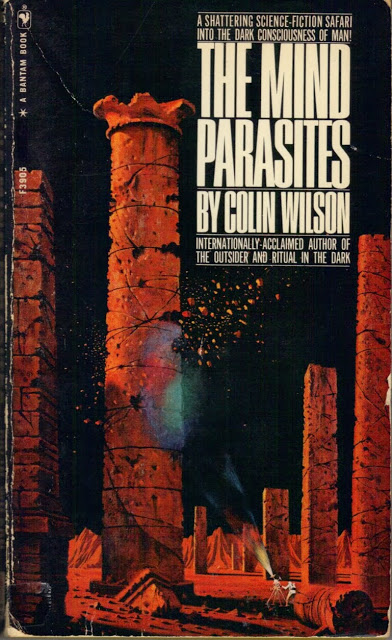Colin Wilson’s The Mind Parasites Channels Lovecraft And Existentialism
This article is more than 2 years old
 When I was in high school, my older brother loaned me a beat up paperback with an ominous title: The Mind Parasites. All he said was, “Read this.” His unusual terseness and seriousness piqued my interest and I settled down soon thereafter to read it, much in the way one settles down to watch a good horror movie. The comparison bears out—The Mind Parasites is one of the most terrifying books I’ve ever read. I’ve now read it three times, and with each reading, I find new details that make this horror story all the more frighteningly plausible.
When I was in high school, my older brother loaned me a beat up paperback with an ominous title: The Mind Parasites. All he said was, “Read this.” His unusual terseness and seriousness piqued my interest and I settled down soon thereafter to read it, much in the way one settles down to watch a good horror movie. The comparison bears out—The Mind Parasites is one of the most terrifying books I’ve ever read. I’ve now read it three times, and with each reading, I find new details that make this horror story all the more frighteningly plausible.
Colin Wilson is a British author and philosopher whose best-known work is The Outsider, which explores existentialism and the artists and writers shaped by the philosophy, such as Albert Camus. Wilson’s fascination with existentialism also plays a huge role in his fictional works, including The Mind Parasites.
The premise of the book is that there’s an alien invasion—except it’s not the kind you’d find in most science fiction. This is an internal alien invasion, like a cancer. But these intruders don’t poison the body, they poison the mind. The narrator of the book figures out what’s going on when he learns of the suicide of one of his close friends—a brilliant, ambitious man who was not unhappy in the slightest.
As the narrator scours his friend’s papers and journals for clues, he also investigates the appearance of strange basalt monoliths the likes of which no one has ever seen. As he pursues this archaeological find, which turns out to be something akin to an underground city, it becomes clear that these monuments are tied to something or someone else. Sounds like Lovecraft, doesn’t it? That’s because Wilson was a huge fan, and in the preface of the book he acknowledges how much Lovecraft’s work, particularly the Cthulhu Mythos, influenced him. Some have called The Mind Parasites a “parody” of that work, as it’s ripe with correlations, including the mind parasites themselves, which are inspired by the “Great Old Ones” in Lovecraft.
The narrator amasses scientist and philosopher friends to help him in his quest, and as they head to the site to conduct research they experience strange headaches, fear, depression—all symptoms that, along with some practical hiccups, threaten to derail their explorations. As the narrator continues to sift through his friend’s journals, he becomes convinced that his death was indeed suicide, but resulted from a sudden and overwhelming mental darkness. After pondering trends such as suicide, crime rates, and pervasive historical and societal problems, the narrator asks himself, “What was destroying the human power of self-renewal?”
Many of us ask ourselves somewhat similar questions when we look pessimistically upon civilization. Those who think civilization is or is on the brink of collapsing have a slew of thoughts at the ready: classism, war, overcrowding, dehumanization, advertising, selfishness, tyranny…you’re all familiar with such lists. But what if all of the aspects of civilization that have us fearing for the future have one single cause? This is the narrator’s key insight: “I began to suspect the existence of mind vampires. And from then on, everything confirmed my guess.”
This, the central idea behind The Mind Parasites, becomes more and more compelling as the book goes on. And if you think about it, it isn’t really so preposterous. Sure, there are all kinds of social, cultural, environmental, and psychological explanations for evil and corruption in the world, but the way Wilson examines how those symptoms manifest from something deep and dark within a person’s soul and psyche, the more plausible it becomes that the root of all those problems lies buried within us.
In the tradition of folks such as Aldous Huxley, the narrator uses psychedelics to explore the far reaches of his mind until he “feels” the alien invaders. There are some tense and awesome scenes in which his mind is the battleground, and he pushes back against the insidious invisible forces threatening to overtake him. This confirms his suspicions, and he begins to devise a plan about how to stop the mind parasites, also known as the Tsathogguans—another nod to Lovecraft.
Admittedly, there are some over-the-top parts of the book where, much like when you read Lovecraft, it’s tempting to laugh out loud. Conspiracy theorists such as David Icke in the video below have latched onto similar concepts. But Wilson’s earnestness and the way he links the most outlandish events and concepts to the central premise ultimately prevail. The ending isn’t my favorite part, but because I find the premise so compelling, I’m willing to go with it.
There’s so much sci-fi these days in which humans are poisoned by some kind of contagious virus—The Strain, Helix, The Walking Dead, and The Passage come immediately to mind. There’s also plenty of sci-fi in which people are possessed by aliens or other supernatural forces. This book offers a unique spin on those ideas—a situation in which mankind has been fooled for centuries into believing that one’s enemies and/or one’s society was the enemy, or even one’s own frailties, causing humankind to wage wars against all the wrong targets. Wilson uses a sci-fi/horror premise to question the nature of self—a question that has never has the same answer twice, which is what brings me back to this book again and again.












